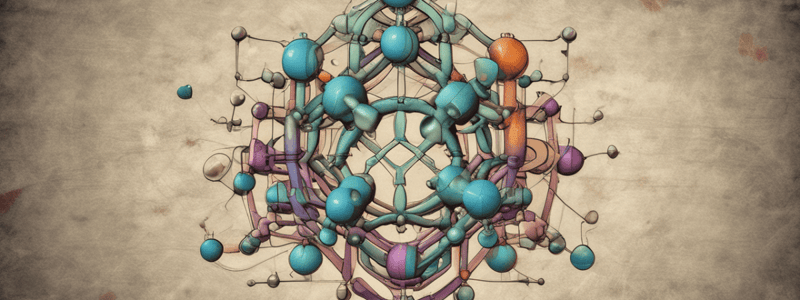Podcast
Questions and Answers
What is the charge that an atom appears to have when the electrons are distributed according to certain rules?
What is the charge that an atom appears to have when the electrons are distributed according to certain rules?
- Ion number
- Electron number
- Oxidation number (correct)
- Valence number
What is the sum of oxidation numbers in a molecule?
What is the sum of oxidation numbers in a molecule?
- Zero (correct)
- Always a positive number
- Always a negative number
- Equal to the charge on the ion
What is the oxidation number of oxygen in a peroxide?
What is the oxidation number of oxygen in a peroxide?
- +1
- -1 (correct)
- +2
- -2
What is the oxidation number of copper in a compound?
What is the oxidation number of copper in a compound?
What is the oxidation number of an uncombined element?
What is the oxidation number of an uncombined element?
What is the oxidation number of a Group 1 element in a compound?
What is the oxidation number of a Group 1 element in a compound?
What is the sum of the oxidation numbers of all atoms in a complex ion?
What is the sum of the oxidation numbers of all atoms in a complex ion?
What is the oxidation number of hydrogen when bonded to a non-metal?
What is the oxidation number of hydrogen when bonded to a non-metal?
What is the oxidation number of oxygen when bonded to fluorine?
What is the oxidation number of oxygen when bonded to fluorine?
Flashcards are hidden until you start studying
Study Notes
Oxidation Numbers
- Oxidation number is the charge an atom appears to have when electrons are distributed according to certain rules.
- Uncombined element has an oxidation number of zero.
Rules for Oxidation Numbers
- Sum of oxidation numbers in a molecule is zero.
- Oxidation number of an ion of an element is the same as its charge.
- Sum of oxidation numbers of all atoms in a complex ion equals the charge on that ion.
Oxidation Numbers of Specific Elements
- Hydrogen has an oxidation number of +1 when bonded.
- Oxygen has an oxidation number of -2, except:
- In peroxides, its oxidation number is -1.
- When bonded to fluorine, its oxidation number is +2.
- Group 1 elements have an oxidation number of +1 in compounds.
- Group 2 elements have an oxidation number of +2 in compounds.
- Halogens have an oxidation number of -1 when bonded to a less electronegative atom.
Transition Metal Oxidation States
- Chromium: +2, +3, +6
- Manganese: +2, +3, +4, +6, +7
- Iron: +2, +3, +6
- Copper: +1, +2
Studying That Suits You
Use AI to generate personalized quizzes and flashcards to suit your learning preferences.




